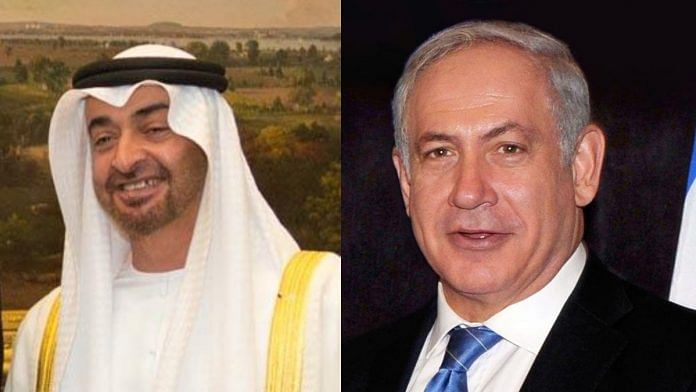Tel Aviv/Dubai: When Tel Aviv-based financier Edouard Cukierman started his first fund in the late 1990s, some of the investors he signed up from the United Arab Emirates hid their identity behind a trust to keep their involvement discreet.
Now, the LinkedIn account of the head of Cukierman & Co. Investment House Ltd. is buzzing with 20 to 30 messages a day from Emiratis eager to do deals — without having to conceal themselves. The shift comes after a U.S.-brokered peace process aimed at ending decades of official hostility between the two Middle East nations.
“The timing is great to start building cross-border transactions in a much more open manner,” said Cukierman, who is already planning a trip to the UAE in September to scout local partners.
The investor is among many businesses hoping the Israel-UAE pact will usher in an economic boom. While Israel’s peace deals during the 1970s and 1990s with Egypt and Jordan resolved military conflicts, the relationships never blossomed into strong corridors for trade or investment.
Israeli entrepreneurs are also preparing for a flood of investments into the local technology industry, which along with a shared enmity of Iran, has been a key motivator for the talks. Israel is a tech hub with more than 6,000 startups and both sides share expertise and common needs around areas of health-care, cyber-security and agricultural innovation.
For the UAE, betting on technology is another key element of diversifying its economy away from oil. It also opens up the possibility of exporting goods and services to Israel from the UAE’s free zones, where foreign companies are allowed to take full ownership of companies and regulation is lighter.
Companies from the UAE already purchase services from some Israeli firms, according to Erel Margalit, founder and chief executive officer of Jerusalem Venture Partners. The next step could see these become partnerships on investment, which would strengthen trust, especially if it’s combined with political goodwill, he said.
It’s “more deals, more business, more investments that we will be doing together,” Margalit said.
Israel plans to open a commercial mission at its eventual embassy in the UAE, and is targeting both trade and investment of up to $500 million.
Also read: UAE, Israeli ministers plan to meet as business deals begin to take shape
Immediate timelines
As the peace talks signal an end to years of covert trading, officials are working on all manner of agreements to bring cooperation into the open. Shortly after the announcement, an Emirati and an Israeli company said they would work together on coronavirus research, while Israeli telecommunications and airline firms have reached out to the UAE to establish commercial links.
“The timelines are quite immediate,” Israeli Minister of Science and Technology Izhar Shay said in an interview on Bloomberg TV Monday.
Foreign investment makes up the bulk of funding for Israeli high-tech startups, a critical sector that accounts for about 10% of jobs, but is disproportionately key to Israel’s productivity and output.
Yifat Oron, the chief executive officer of a tech-banking unit at Bank Leumi Le-Israel BM, said that in a few years the UAE could contribute up to 10% of tech investment in Israel — which totaled over $8 billion last year.
“The pace that it’s going to grow is going to be a surprise,” she said.
Emiratis are also optimistic that Israel’s venture capital and large pension funds will pour investments into Gulf-based firms. Even before the formal announcement, a top executive at Abu Dhabi’s sovereign wealth fund called on Israelis to deploy capital in the region.
“In return for their investments in Israeli tech firms, the UAE will expect technology transfer to the UAE,” said Nicholas Gilani, co-founder and managing partner of Cyal Advisors, a UAE-based consultancy firm. The UAE will probably also require the establishment of a local presence in business centers in Abu Dhabi or Dubai, he said.
‘Early days’
Some businesspeople are more cautious, acknowledging that it will take time and trust to build significant partnerships.
“Once the legal, political and public-relations ambiguity of the deal is clear and risks understood, expect a two-sided movement — money will flow both ways,” said Dubai-based Kushal Shah, the head of digital and technology for Asia and Middle East at Roland Berger LLC. “It is early days. Most boards will respect the sensitivity of such deals and approach with caution.”
For Cukierman, who took his fund public on France’s stock exchange after raising cash, investment flows could surge soon.
“The number can grow very fast if I look at the level of interest,” he said. –Bloomberg
Also read: There are military reasons as well to celebrate the Israel-UAE breakthrough



